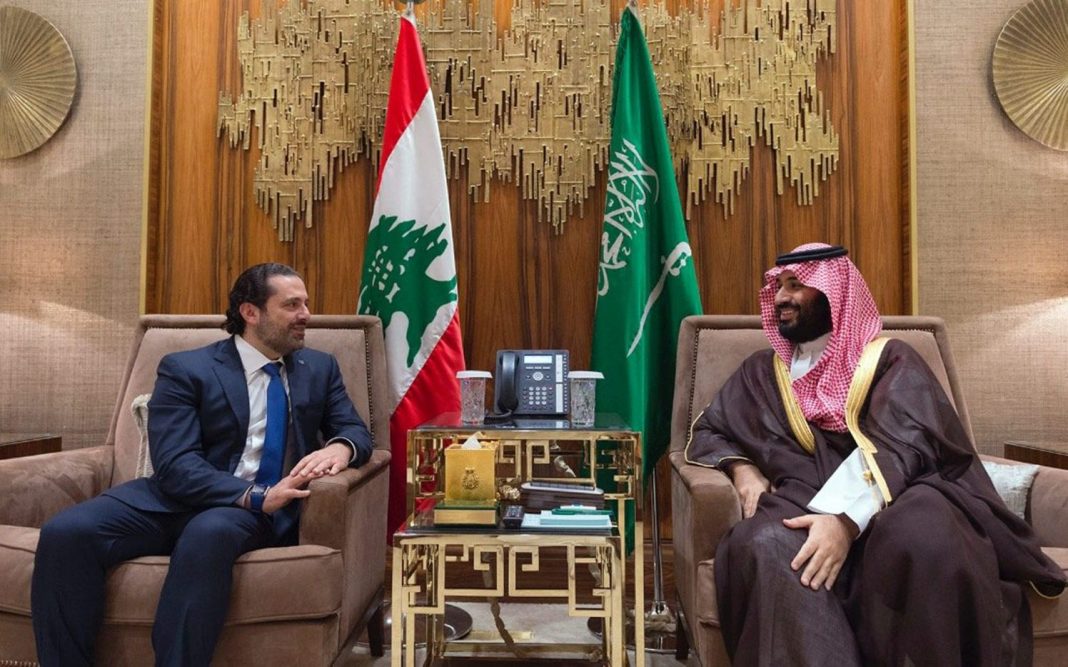Prime Minister Hariri’s Resignation Threatens Iranian Grip on Lebanon
زافي بارل في صحيفة هارتس: استقالة الحريري تهدد قبضة إيران على لبنان
Zvi Bar’el/Haaretz/November 06/17
Saad Hariri’s exit reflects a Saudi ultimatum not only to stop compromising with Hezbollah, but also to resign and put the militia and Tehran in a bind.
His explanation was that the situation in Lebanon reminded him of the period leading up to the murder of his father, former Prime Minister Rafik Hariri, and also that “Iran is trying to destroy the Arab world, and Hezbollah’s weapons are aimed at Syrians and Lebanese.” But was fear of being assassinated really behind his decision?
The Saudi media reported a few details that could indicate that an assassination was being planned; for example, the observation towers that monitor Hariri’s convoys for security reasons had been shuttered, ostensibly to prevent anyone from summoning aid during an assassination attempt. But if this were the real reason, why didn’t he announce it Monday when he arrived in Saudi Arabia on the first of his two separate trips there in recent days?
Thus it seems the real reason stems from what he heard during those two trips to Saudi Arabia, and especially the scathing criticism by Thamer al-Sabhan, the Saudi minister of state for Gulf affairs, of the Lebanese government’s failure to curb Hezbollah and Iranian influence in Lebanon.
Saudi King Salman and his son, Crown Prince Mohammed, are waging an uncompromising war on Iran’s regional influence, so they find it hard to tolerate the continued presence of Hezbollah ministers in Hariri’s cabinet. The Saudis have been gritting their teeth over this since Hariri formed his government a year ago.
‘Flexibility’ toward Hezbollah
Hariri’s national consensus government has preserved Lebanon’s political stability, but at the cost of concessions to Hezbollah, and therefore de facto to Iran. Hariri has not demanded Hezbollah’s disarmament (despite calling its weapons illegal), has let the Lebanese army cooperate with Hezbollah in expelling the Islamic State from Lebanon’s border with Syria, and supported the appointment of Hezbollah’s candidate, Michel Aoun, as president. (Aoun subsequently made Hariri prime minister.
Hariri’s “flexibility” toward Hezbollah has also outraged some of his prominent Lebanese supporters, who warned him against falling into Hezbollah’s honey trap. But Hariri thought he could manipulate the organization for his own purposes.
Hezbollah did help Hariri manage his government. Contrary to its efforts in previous cabinets, it didn’t thwart government initiatives and generally tried not to embarrass the government in which it sat. But as months passed, it became clear not just to the Lebanese, but also to the Saudis, that their protégé Hariri, who holds both Saudi and French passports, was having trouble deciding whether he was “Saudi or Iranian.”
Saudi anger exploded after Ali Akbar Velayati, an adviser to Iran’s supreme leader, Ali Khamenei, said during a visit to Lebanon on Friday that “Lebanon’s victory over terror is a victory by the resistance” – meaning Hezbollah – and that Iran “will continue to protect Lebanon and won’t let things go back to the way they were before.”
Velayati’s meetings with Aoun, Hariri and parliament speaker Nabih Berri, on the same day that Russian President Vladimir Putin was in Tehran, were the last straw. Not only was Iran publicly flaunting its involvement in Lebanese affairs and trying to tilt Russia against Saudi Arabia, but Hariri was hosting the Iranian envoy as if he were an ally.
Political paralysis now
Hariri’s urgent second trip to Saudi Arabia has two possible explanations. Either he received a message from Velayati to give to King Salman, or he was summoned for a reprimand because he “hadn’t understood” the unsubtle hints he received from Saudi officials Monday. The first is unlikely. Hariri’s resignation indicates that the Saudis gave him an ultimatum. He must not only stop compromising with Hezbollah, but also resign in order to put
Hezbollah and Iran in a bind in Lebanon.
A bind is exactly what Lebanon can expect now, because the government will be paralyzed until a new prime minister is chosen. Granted, Hariri will stay in office until a replacement is found, but he’ll no longer be bound by his agreements with Hezbollah, as seen in his criticism of the organization in his resignation announcement Saturday.
Theoretically, Aoun can tap another minister or member of parliament to form a government. But experience shows that the process of forming a government in Lebanon is like an elephant’s pregnancy. At best, it will take many long weeks. At worst, it could spark violent clashes between Hariri’s supporters and Hezbollah supporters, rioting by armed militias, and attacks on Syrian refugees, who already face a nonviolent assault in the form of demands that they leave Lebanon.
Hezbollah and Iran understand the threat posed by Hariri’s resignation quite well, and Iran’s response – that “the resignation was a plot by Saudi Arabia and the United States” – reveals its fear of losing control of Lebanon, which until has now been run more or less to Tehran’s satisfaction. Still, it’s premature to envision disaster scenarios under which Hezbollah would exploit the resignation to attack Israel in order to demonstrate its continued control over the political arena.
Zvi Bar’el/Haaretz Correspondent



















